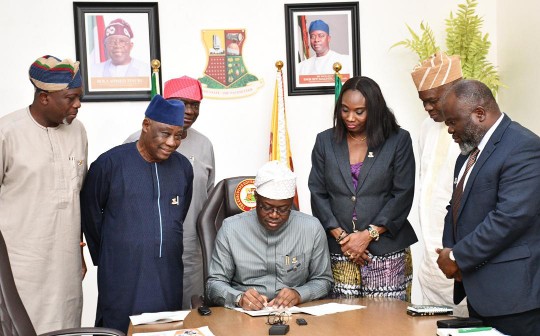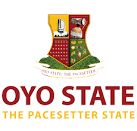Oyo State governor, Seyi Makinde (middle), signing the Executive Order on the Protection of Mining Communities against Insecurity and Exploitation in the State and the Executive Order on the Establishment of the Ministry of Culture and Tourism. With him from left are the Chief of Staff, Hon Segun Ogunwuyi (left); Deputy Governor, Barr Bayo Lawal; Chairman, Oyo State Minerals Development Agency, Hon Abiodun Oni; Secretary to the State Government, Professor Olanike Adeyemo; Commissioner for Culture and Tourism, Dr Wasiu Olatunbosun and the Attorney General and Commissioner for Justice, Barr Abiodun Aikomo, at the Governor’s Office, Secretariat, Ibadan. PHOTO: Oyo Gov’s Media Unit.
“Oyo State is endowed with many solid minerals such as lithium, gold, marble, gemstones, iron ore, tantalite, kaolin and talc. With the large deposits of these minerals as well as their high quality, the state stands a chance of grossing a tidy sum annually from them.”
Governor Seyi Makinde’s comparative advantage is his brainpower. His ability to think through complex issues and come up with unconventional albeit unimpeachable results is mind-boggling. He dissects issues with the contemplation of a philosopher, the equanimity of a neurosurgeon, the dexterity of a scientist, the precision of an engineer, the prescience of an entrepreneur and the altruism of a leader.
The application of this in his business transformed it into a multinational organisation within a decade. Introducing same to governance made him a trendsetter in less than a year as a state governor. The well-told story of how Governor Makinde’s handling of the COVID-19 crisis in Oyo State became the national standard still remains music to the ears and balm to the soul.
Following in this tradition, Governor Makinde on October 24, 2023, signed two Executive Orders; one was on the creation of the Ministry of Culture and Tourism following the excising of same from the Ministry of Information, while the other was to emplace a structure for the solid mineral sector with a view to taking care of the interests of all stakeholders, especially the host communities and the environment.
The two Executive Orders were hinged on the governor’s determination to leverage both tourism and solid mineral sectors to widen the state’s economy in his second term in office. In his first term, Governor Makinde had grown the economy through the development of infrastructure and agribusiness.
The Executive Order on protecting mining communities is the focus of this piece.
Oyo State is endowed with many solid minerals such as lithium, gold, marble, gemstones, iron ore, tantalite, kaolin and talc. With the large deposits of these minerals as well as their high quality, the state stands a chance of grossing a tidy sum annually from them. According to a report by a mining and exploration company, Oyo State has what is considered to be Nigeria’s most significant lithium pegmatite occurrence.
To underscore the growing profile of the state in the solid mineral sector, the Federal Government, in May this year, established the country’s first gemstone market in Ibadan to serve as a platform for buyers and sellers to meet, negotiate prices and exchange information about quality, origin and processing of gemstones. So, the stage is set for a revenue haul by the state from the solid mineral sector. Through earnings from solid minerals, Oyo State is poised for an era of greater prosperity, progress and abundance.
But that is on the one hand.
The flipside is that the twin problem of criminality and environmental degradation usually boards the same bus with mineral exploitation. Solid minerals attract illicit miners just as sugar draws bees. Illegal mining births mineral trafficking, trafficking leads to economic crimes, organised crimes, banditry and eventually environmental degradation. So, solid mineral exploitation can breed bloodletting, agony and poverty.
The examples are too numerous; from the Niger Delta region of Nigeria where crude oil exploration has become a curse rather than a blessing; to Zamfara State where lead and gold mining has left the people with sorrow and poverty; to Guinea where solid mineral exploitation has pauperised the people; to Liberia, where struggle for control over solid minerals resulted in a civil war. More often than not, the recompense for a mineral deposit host community is grief, grief and more grief.
But that is where leadership is lacking.
According to Murphy’s Law, whatever can go wrong will go wrong. The only way to prevent anything from going wrong is to take charge of the process. That is what great leaders do. They know that life is governed by the principle of cause and effect. So, they take charge of the cause to determine the effect. Those who take charge of the cause determine the course of event and determine the effect. Therefore, they take their destiny in their hands; they do not subject themselves to the mercies of situations and circumstances. By being proactive, they protect themselves from harmful effects.
This is what Governor Seyi Makinde has done with the Executive Order on solid minerals. The Executive Order has five major components: protection of the host communities from exploitation, protection of the environment from degradation, protection of residents from insecurity, collection of state-based levies and taxes and ensuring compliance of all stakeholders with the Executive Order.
With the Executive Order now in force, all agreements reached between mineral deposit host communities and mining companies must be submitted to the state’s Mineral Deposit Agency (MDA) for transmission to the Ministry of Justice for vetting before signing by the relevant heads or representatives of the community. If the Ministry is satisfied with the draft agreements, the MDA will issue a letter of advice to the relevant community. In addition, all mining companies and the host communities must submit all previously signed draft agreements to the Ministry of Justice through the MDA for documentation.
The import of this is that no agreement between any community and a mining company is binding without the seal of the state. With this in place, host communities are guaranteed of a good deal from any mining companies. Now, host communities are protected from exploitation by mining companies that may want to capitalise on a few people’s avarice to subject a whole community to penury and bondage.
The Executive Order similarly states that any holder of mineral title in Oyo State must conduct an Environmental Impact Assessment (EIA) before the commencement of any mining exploration or activity to assess the impact of its activities on the environment, while all holders of mineral titles already carrying out mining activities in the state must immediately conduct an Environmental Impact Assessment.
It also states that all EIA carried out by holders of mineral titles shall be vetted and approved by the MDA. In addition, all holders of mineral titles are under obligation to carry out restoration and reparation of the land and environment as detailed in their Environmental Impact Assessment reports. The essence of this is to protect the environment from degradation. With this Executive Order any mining company knows that it cannot abandon any mining site without restoring and rehabilitating it.
Going forward, the Executive Order also compels all holders of mineral titles operating in Oyo State to undergo checks by the MDA in collaboration with relevant security agencies in the state to verify their legal status, citizenship and background before settlement in the communities to ensure peace and security in the communities.
In addition, every employee of a mining company must be duly registered by the MDA and security agencies. This enables the security agencies to keep a tab on everyone working on a mining site and protect the host communities from the incidence of “unknown gunmen” or bandits.
The MDA and the Oyo State Board of Internal Revenue are to ensure the collection of all relevant state-based taxes, levies, fees, charges, etc related to all mining entities doing business in the state, while the Ministry of Justice, Mineral Development Agency, Ministry of Environment and Natural Resources, Oyo State Board of Internal Revenue, local government councils, traditional institutions, security agencies are mandated to ensure compliance with the Executive Order and initiate investigation and prosecution of any defaulter in accordance with the Law.
So, while ensuring that the state gets its due from mining activities by putting measures in place to see that appropriate taxes and levies are paid into the coffers of the state, the government has also instituted a structure to ensure compliance and guard against anyone gaming the system.
With this Executive Order, Governor Seyi Makinde has achieved two major things. One, he has set the stage for Oyo State to profit from its natural endowments without throwing the people under the bus or putting the environment in harm’s way. Now, the state can look forward to earning good money from its natural endowments without the blood of the citizens being spilled, a community being sacked by criminals or the environment being degraded.
Governor Makinde has demonstrated that he cares about the people he leads and that the wellbeing of the citizens forms the fulcrum of his administration. He has shown that solid mineral exploration can be done without people exploitation. He has shown that by emplacing the right structures and systems, the business of solid mineral extraction can be done without bloodletting, armed conflict, brigandage or banditry.
The second thing is that Governor Makinde has also given the nation a template on how to manage natural resources for the benefit of all stakeholders without the people being ripped off or the environment being ripped apart. As it was during the COVID-19 era when Governor Makinde set the national standard, he has set another national standard in natural resources management.
In any society, leadership makes the difference between life and death, safety and peril, growth and decline, joy and grief, freedom and bondage as well as prosperity and penury. The difference is in the ability to think differently.
 Hottestgistnaija.com
Hottestgistnaija.com





